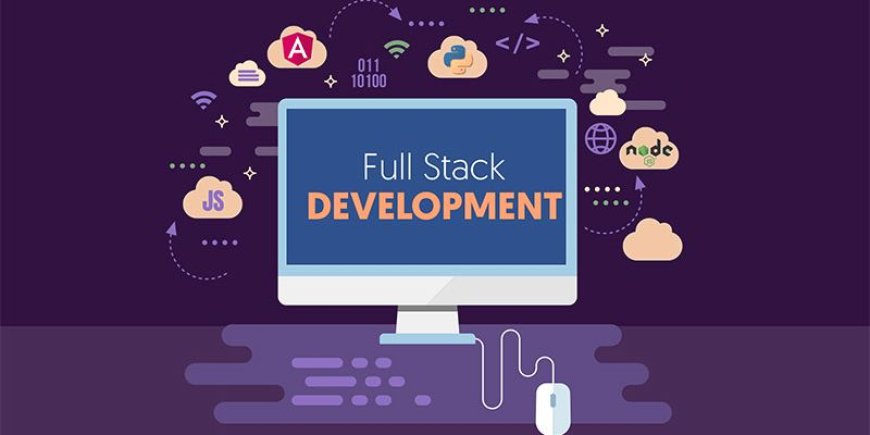Career Roadmap to Be a Successful Full Stack Developer in 2025
This Article is about the Career Roadmap to Be a Successful Full Stack Developer in 2025. Full Stack Developer Course in Chennai can prove to be a game-changer.

The demand for Full Stack Developers is still on the rise in 2025, owing to companies looking for experts who can handle both the frontend and backend of an application. If you love coding and wish to be a balanced developer, this roadmap will walk you through every step of your journey. For individuals who like learning in a guided manner, taking admission in a structured program such as a Full Stack Developer Course in Chennai can prove to be a game-changer.
Understanding the Role of a Full Stack Developer
Before diving into the technical skills, it’s essential to grasp what a Full Stack Developer actually does. They work on both the frontend (the part users interact with) and the backend (the part that powers the application behind the scenes). A Full Stack Developer handles databases, servers, APIs, and often deployment tasks. Collaboration is also key, as they regularly interact with designers, other developers, and project stakeholders.
Establishing a Solid Foundation in Web Development
The process starts with learning the fundamentals of web development. This involves studying HTML5 and CSS3 to build and style websites efficiently. JavaScript is the second important step, allowing you to introduce interactivity and manage the behavior of web pages. Learning how to make your designs responsive with CSS Flexbox, Grid, and media queries is also vital.
Diving Deep into Frontend Technologies
Once you've settled with the basics, you can delve into frontend frameworks and libraries of today. React.js is a favorite, but Angular and Vue.js are also solid choices. You'll also want to familiarize yourself with npm or yarn for package and tool management and Webpack and Babel for optimizing your workflow. Working with state using Redux or Context API will also add to your skills.
Getting Hands-On with Backend Development
As a Full Stack Developer, you require backend skills. Node.js is an excellent option for JavaScript enthusiasts, but Python with Django or PHP with Laravel are also good alternatives. You must also know how to work with databases—both NoSQL such as MongoDB and SQL-based such as MySQL or PostgreSQL. Knowing how to create RESTful APIs and handle user authentication using JWT or OAuth is also crucial.
Adopting Version Control and Team Work
No coder codes alone, and therefore it is essential to be aware of using version control systems such as Git and tools such as GitHub. The basics of branching, merging, and pull requests are essential. Some understanding of Agile methods, issue tracking using Jira or Trello, and team-working too will find you employment-ready.
Discovering DevOps and Deployment Skills
In the current agile world, developers are usually required to take care of deployment as well. You will have to learn how to deploy applications through platforms such as Heroku, Netlify, or Vercel. You should be aware of cloud providers such as AWS or Firebase and implement CI/CD pipelines with tools such as GitHub Actions or Jenkins. Knowing the basics of Docker will also benefit you.
Moving Ahead with Cutting-Edge Technologies
To be different, look into future-developing topics. TypeScript brings type safety to JavaScript. GraphQL is a lean substitute for REST APIs. WebSockets will enable you to include real-time capabilities such as chat. Additionally, practice test writing with Jest, Mocha, or Cypress to make your applications stable.
Developing Real-World Projects and a Portfolio
Your expertise is just as useful as your capacity to implement it. Begin building actual projects—consider e-commerce sites, messaging apps, or blog systems. Not only do they demonstrate your skills but also provide evidence of your experience. Keep clean code, document your code, and make it all public on GitHub with a link from your individual portfolio website.
Gaining Practical Experience Through Internships and Freelancing
By the time you've built a few projects, you should start applying for internships or freelance work. That real-world experience will boost your skills and get you a better job candidate. Look for platforms like Upwork or Freelancer for work and at LinkedIn or Internshala for internships. Open-source projects are a good way to gain experience and connect with people as well.
Preparing for Interviews and Getting Hired
To translate your learning into a job opportunity, prepare for technical interviews. Review data structures and algorithms on LeetCode or HackerRank. Familiarize yourself with basic system design concepts and prepare for behavioral questions regarding your collaboration, issues encountered, and project results. Mock interviews and coding exercises will make you confident. The path to becoming a Full Stack Developer in 2025 is evident but requires steady effort. From learning fundamental technologies to developing real-world projects, every step takes you one step closer to your destination.













































































